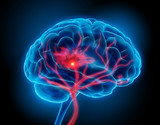Music therapy is used widely for rehabilitation of patients that have had a stroke. A study reported by Brain Journal of Neurology by the Oxford University Press stated that incorporating music into standard stroke rehabilitation treatments helps improve recovery of speech and memory.
Specifically, when comparing treatment of music to either language therapy or no alternative therapy, the music had a more significant impact on recovery than the use of audio books or no additional stimuli at all. The study also showed that the music lightened the spirits of patients.
According to the study, after six months of therapy the music listeners' verbal memory improved by 60% and remembrance improved by 17%, much higher than the results noted in audio book listeners or patients with nothing. Furthermore, the music listeners were happier and less confused than members of the other groups. The research was carried out on adults who had suffered an ischaemic middle cerebral artery stroke with no prior history of neurological disorder.
Strokes occur when blood can't reach the brain, killing brain tissues. This can cause disability in movement and cognition, as well as death. The stroke can also cause weakness, loss of coordination, and pain. The aftermath of the event includes memory loss, confusion, depression, difficulty speaking, paralysis, and sensory loss.
Standard treatment includes medication to thin the blood that will prevent further clotting, and restrictions on the patient's diet to help improve cholesterol levels.
Musical therapy treatment incorporates melodies that boost alertness, mood and attention due to stimulation of the dopaminergic mesocorticolimbic system, which moderates feelings of pleasure and memory, among other emotions.
By stimulating this system, you trigger the wires for other parts of the brain through neurological connections. Doctors believe that the combination of music and lyrics creates connections, which help to recover losses in other parts of the brain.
Many therapists already use music as a tool. Singing songs can boost speech recovery in stroke patients. By putting words to a familiar song melody, the patient has an easier time of forming words and phrases. Rhythm and clapping, also used by therapists, aid in the recovery of movement and muscle control.
After a stroke, it's important to begin music therapy early, during the acute post-stroke stage. During this period, the brain undergoes many changes that relate to movement, memory and speech that can be augmented by stimulation. The greatest advantage of music therapy is that it can easily be added your your daily routine. Music is everywhere, so with proper guidance you can treat yourself or your loved ones outside of the hospital, maintaining ongoing recovery and a routine of incorporating healthy brain stimulation.
Music therapy can have quite an impact when added to the standard treatment for stroke victims, plus it is a less expensive prescription and relatively accessible. When selecting the type of music, choose something that is familiar to the patient. Playing something that they recognize will improve results of the therapy and improve memory development.
If possible, allow the patient to choose the music him or herself as it may provide an indication of their state of mind and the familiarity of the music is frequently the key to memory retention. Selecting the type of music that stimulates the brain to craft thoughts is the technique used in music therapy to recover speech and recollection.
Using rhythm and basic drums like the djembe or frame drums, also used by therapists, aid in the recovery of movement and muscle control. Visit http://www.x8drums.com for more drum therapy instruments and resources.
Article Source: http://EzineArticles.com/?expert=Kristin_Royce
Article Source: http://EzineArticles.com/2653159

No comments:
Post a Comment